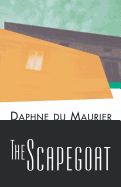
At the beginning of the novel, John is an English professor of French language and culture on holiday in France for research. He is dissatisfied with his life, commenting that he is simply an observer and not an active participant. John wishes he could belong to a French family and feel the sense of kinship and community instead of always feeling on the outside of life.
The phrase "Be careful what you wish for" applies here as John meets Jean de Gue', a French aristocrat who shockingly enough looks exactly like him. After a few drinks and some intimate conversation, John discovers that de Gue' has the opposite problem; he is overburdened by his family. They drink quite a bit. The next day John discovers that de Gue' has drugged him and absconded with his identity, clothes, and car. De Gue's family driver does not believe John when he denies he is Jean de Gue' and takes him to the family chateau. John's first puzzle is figuring out which woman in the sitting room is his "wife."
This book was hard to put down as it was utterly fascinating how John handles his mistaken identity not only in dealing with the family members, but how he becomes so involved with this new identity that he begins to think of himself as Jean de Gue' and not as John. There is a lot of intrigue and family trouble that he is forced to handle. Ultimately, he comes to love the family. The ending is a bit of a shock, but of course I won't share it here. I will end with my two favorite passages from the novel.
One had no right to play about with people's lives. One should not interfere with their emotions. A word, a look, a smile, a frown, did something to another human being, waking response or aversion, and a web was woven which had no beginning and no end, spreading outward and inward too, merging, entangling, so that the struggle of one depended upon the struggle of the other (74-75).
Sometimes it's a sort of indulgence to think the worst of ourselves. We say, 'Now I have reached the bottom of the pit, now I can fall no further,' and it is almost a pleasure to wallow in the darkness. The trouble is, it's not true. There is no end to the evil in ourselves, just as there is no end to the good. It's a matter of choice. We struggle to climb, or we struggle to fall. The thing is to discover which way we're going (200).Du Maurier, Daphne. The Scapegoat. New York: Doubleday, 1957.

This is another I will add to be pile. I loved Rebecca and have wanted to read another by her. You pick great books. I just got Emma Brown from the library today. Great review!
ReplyDeleteDeb, Rebecca is one of my favorite books. This one is good and written in a similar style, but Rebecca is better. Flight of the Falcon is another pretty good one. I hope you enjoy Emma Brown.
ReplyDeleteThis sounds like a great book! I will have to read this one.
ReplyDeleteThis sounds like a fascinating book. The only Daphne du Maurier books I've read so far are Rebecca and Jamaica Inn (and some of her short stories) but I definitely want to read more. Thanks for the great review!
ReplyDeleteI have yet to read one of her books-I have Rebecca on order and if I like that as much as I think I will I will come back and reread your excellent post and may well read this book next-I have signed up for the du Maurier reading challenge
ReplyDelete